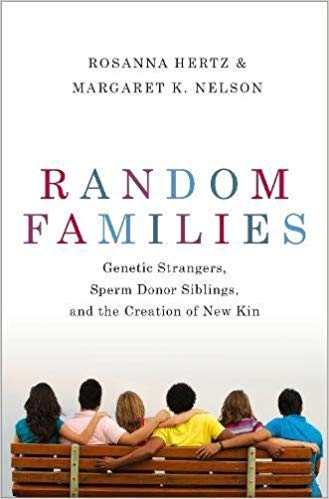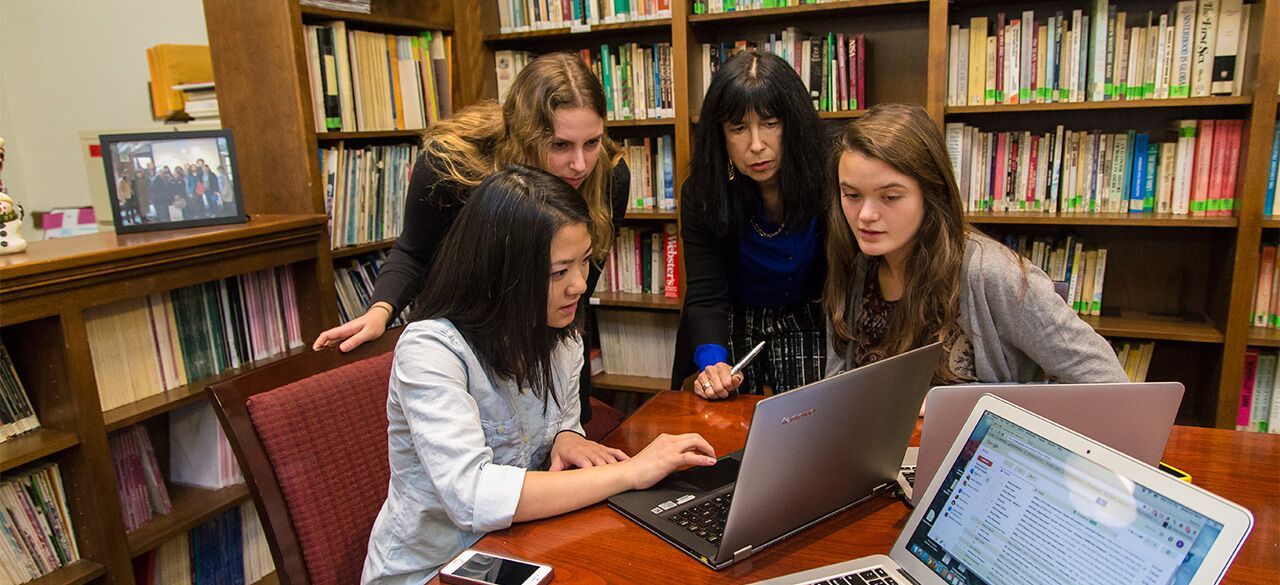Rosanna Hertz working with her students

Her new book, Random Families: Genetic Strangers, Sperm Donor Siblings and the Creation of New Kin, with her coauthor Margaret K. Nelson is available.
Advance Praise for Random Families
“This wonderful book sheds new light on the age-old nature vs. nurture debate by examining how people who are genetically related, although strangers to one another, do (or don’t) form familial connections and bonds. A fascinating exploration of what makes a family in today’s world.”--Jane Mattes, LCSW, Psychotherapist and Founder of Single Mothers by Choice
“Deeply researched and animated by the voices and stories of its subjects—people linked by sperm donation who work to figure out what, if anything, to make of genetic connections between strangers—Random Families is complex, surprising, and at times moving. An important addition to our understanding of how contemporary kinship relations are understood, generated, and modified.” --Joshua Gamson, author of Modern Families: Stories of Extraordinary Journeys to Kinship
“This is an absolutely fascinating study of how kinship can be constructed on the basis of genetic connections which are far outside traditional ‘family’ formations. This carefully crafted empirical study explores how contemporary kinship networks can be formed voluntarily and also documents the emotional and ethical journeys made in the process. Quite simply, this is an essential text for anyone studying contemporary families.” --Carol Smart, Emeritus Professor of Sociology, University of Manchester, UK
“Random Families is a gem, meticulously researched and beautifully written. For students of families—and for social scientists more generally—this book is a remarkable case study both of how new technologies disrupt old institutions and of how old institutions incorporate new technologies. By giving voice to social and genetic parents and, especially, donor siblings themselves, Hertz and Nelson give a new twist to old debates about nature and nurture, showing how ‘genetics’ becomes less a fact of biology and more a rhetorical device around which siblings create a new form of family life.” --Robert Zussman, University of Massachusetts, Amherst
Advance Praise for Random Families
“This wonderful book sheds new light on the age-old nature vs. nurture debate by examining how people who are genetically related, although strangers to one another, do (or don’t) form familial connections and bonds. A fascinating exploration of what makes a family in today’s world.”--Jane Mattes, LCSW, Psychotherapist and Founder of Single Mothers by Choice
“Deeply researched and animated by the voices and stories of its subjects—people linked by sperm donation who work to figure out what, if anything, to make of genetic connections between strangers—Random Families is complex, surprising, and at times moving. An important addition to our understanding of how contemporary kinship relations are understood, generated, and modified.” --Joshua Gamson, author of Modern Families: Stories of Extraordinary Journeys to Kinship
“This is an absolutely fascinating study of how kinship can be constructed on the basis of genetic connections which are far outside traditional ‘family’ formations. This carefully crafted empirical study explores how contemporary kinship networks can be formed voluntarily and also documents the emotional and ethical journeys made in the process. Quite simply, this is an essential text for anyone studying contemporary families.” --Carol Smart, Emeritus Professor of Sociology, University of Manchester, UK
“Random Families is a gem, meticulously researched and beautifully written. For students of families—and for social scientists more generally—this book is a remarkable case study both of how new technologies disrupt old institutions and of how old institutions incorporate new technologies. By giving voice to social and genetic parents and, especially, donor siblings themselves, Hertz and Nelson give a new twist to old debates about nature and nurture, showing how ‘genetics’ becomes less a fact of biology and more a rhetorical device around which siblings create a new form of family life.” --Robert Zussman, University of Massachusetts, Amherst
